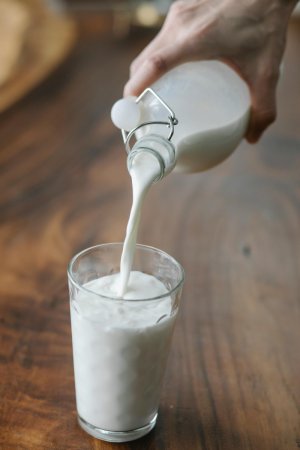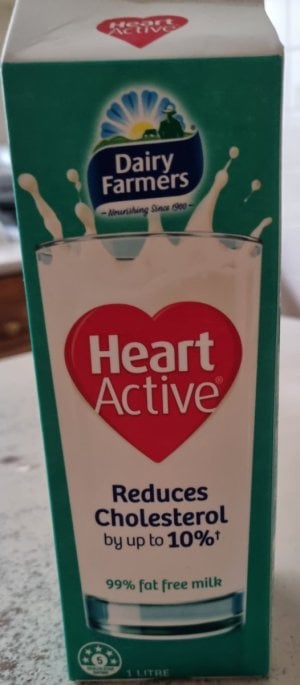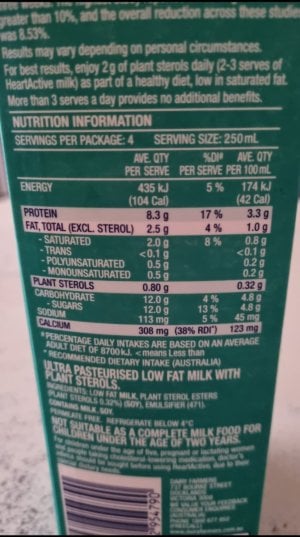This vegan alternative can help you reach your weight loss goal target faster
By
coramarie.ms
- Replies 4
Disclaimer: This article is not meant to be taken as medical advice. Readers are advised to consult their GPs before starting a weight loss or diet regimen.
With increased options for milk, one alternative has gained popularity, particularly in Australia.
If you’re looking into toning down or even entirely ditching your dairy intake, here’s an option that can also help you reach your desired weight goal.
Oat milk is creamy plant-based milk that closely mimics the texture and sweetness of traditional cow's milk.
It’s a perfect choice for those seeking to indulge in their favourite beverages and cereals without the dairy. But it's not just the taste making waves; it is also praised for its nutritional profile.
This plant-based alternative offers several health benefits.
For one, oat milk is made from whole oats that have been soaked, blended and strained. The process of obtaining the product ensures all nutritional contents are kept. It's brimming with calcium, potassium, and essential vitamins like B2 (riboflavin), B12, vitamin A, and vitamin D when fortified.
Aside from these nutrients, oat milk is particularly rich in iron–essential for maintaining energy levels and healthy growth.
Iron becomes increasingly important as we age, given the risk of anaemia in older adults.
Now, what about the fat? Oat milk has a beneficial fat profile compared to whole dairy milk. It is high in healthy unsaturated fat, and has virtually no saturated fat.
This aspect might pique the interest of those who are monitoring our cholesterol levels closely.
But when it comes to calorie count, there's a surprising figure: one cup of unsweetened oat milk contains around 117 calories, less than whole milk's 146 calories, but more than almond milk's mere 40.
So, how does this stack up regarding weight management?
Oat milk does pack more carbohydrates than other non-dairy alternatives. It contains about 15 grams of carbs. Compare that to almond milk, which has just a gram per cup.
Carbs are not the enemy, but their role in weight management should be considered, especially when maintaining a specific carbohydrate threshold for losing weight or managing conditions like diabetes.
However, oat milk's higher protein, fat, and fibre content could help curb hunger throughout the day, potentially aiding in weight loss by reducing overall caloric intake.
But watch out for the sugars–even in some unsweetened varieties. Added sugars can quickly pile up the calorie count.
Brands often add sugar, and oats naturally contain a type of sugar named maltose with a high glycaemic index, which can spike blood sugar levels.
This is particularly important to monitor for seniors, for whom blood sugar management is often a significant concern.
Even while oat milk has numerous beneficial impacts on health, some people may be sceptical that it might aid in slimming down.
It can be challenging to determine which of the many non-dairy milk selections available, such as oat, soy, almond, or rice milk, will aid your weight loss goals the most.
Let's put oat milk in a side-by-side lineup with other types of milk to examine its potential for weight loss further:
Oat milk can be a solid choice if you’re seeking a healthy balance that aligns with weight loss goals and nutrition for your age.

Dear members, what are your experiences with non-dairy milk alternatives? Have you noticed a difference in how they affect your appetite or weight management? We'd love to hear your stories in the comments below.
With increased options for milk, one alternative has gained popularity, particularly in Australia.
If you’re looking into toning down or even entirely ditching your dairy intake, here’s an option that can also help you reach your desired weight goal.
Oat milk is creamy plant-based milk that closely mimics the texture and sweetness of traditional cow's milk.
It’s a perfect choice for those seeking to indulge in their favourite beverages and cereals without the dairy. But it's not just the taste making waves; it is also praised for its nutritional profile.
This plant-based alternative offers several health benefits.
For one, oat milk is made from whole oats that have been soaked, blended and strained. The process of obtaining the product ensures all nutritional contents are kept. It's brimming with calcium, potassium, and essential vitamins like B2 (riboflavin), B12, vitamin A, and vitamin D when fortified.
Aside from these nutrients, oat milk is particularly rich in iron–essential for maintaining energy levels and healthy growth.
Iron becomes increasingly important as we age, given the risk of anaemia in older adults.
Now, what about the fat? Oat milk has a beneficial fat profile compared to whole dairy milk. It is high in healthy unsaturated fat, and has virtually no saturated fat.
This aspect might pique the interest of those who are monitoring our cholesterol levels closely.
But when it comes to calorie count, there's a surprising figure: one cup of unsweetened oat milk contains around 117 calories, less than whole milk's 146 calories, but more than almond milk's mere 40.
So, how does this stack up regarding weight management?
Oat milk does pack more carbohydrates than other non-dairy alternatives. It contains about 15 grams of carbs. Compare that to almond milk, which has just a gram per cup.
Carbs are not the enemy, but their role in weight management should be considered, especially when maintaining a specific carbohydrate threshold for losing weight or managing conditions like diabetes.
However, oat milk's higher protein, fat, and fibre content could help curb hunger throughout the day, potentially aiding in weight loss by reducing overall caloric intake.
But watch out for the sugars–even in some unsweetened varieties. Added sugars can quickly pile up the calorie count.
Brands often add sugar, and oats naturally contain a type of sugar named maltose with a high glycaemic index, which can spike blood sugar levels.
This is particularly important to monitor for seniors, for whom blood sugar management is often a significant concern.
Even while oat milk has numerous beneficial impacts on health, some people may be sceptical that it might aid in slimming down.
It can be challenging to determine which of the many non-dairy milk selections available, such as oat, soy, almond, or rice milk, will aid your weight loss goals the most.
Let's put oat milk in a side-by-side lineup with other types of milk to examine its potential for weight loss further:
- Oat milk versus almond milk: Almond milk may have fewer calories and carbs but lacks the richness and satisfying feel of oat milk.
- Oat milk versus coconut milk: Coconut milk is less processed and lower in calories but doesn't offer oat milk's protein and fibre benefits.
- Oat milk versus regular cow's milk: Cow's milk is higher in protein and calcium, yet contains lactose, which is problematic for many.
- Oat milk versus skim milk: Skim milk might win on calorie count, but oat milk offers more satiating fats.
- Oat milk versus soy milk: Soy milk is a protein champion but falls short on taste for many.
- Oat milk versus rice milk: Both are grain-based with similar calorie counts, but oat milk takes the lead on protein and fibre.
- Oat milk versus macadamia milk: Macadamia is lower in carbs, nudging out oat milk for those watching their carb intake.
Oat milk can be a solid choice if you’re seeking a healthy balance that aligns with weight loss goals and nutrition for your age.
Key Takeaways
- Oat milk has become a popular dairy alternative in Australia known for its creamy texture and slight sweetness.
- While oat milk offers numerous health benefits, such as being rich in vitamins A and D, calcium, phosphorus, potassium, and iron, it does contain more carbohydrates than other milk alternatives.
- For weight loss, oat milk may be filling due to its higher protein, fat, and fibre content, but its higher carbohydrate and potential added sugar content may not make it the best choice for those reducing their carb intake or looking to minimise calorie consumption.
- When comparing oat milk with other types of milk and milk alternatives, it has fewer calories than regular milk but not as much protein and calcium; it is richer in nutritional content than coconut and almond milk but has more carbs; and it’s a lactose-free option, unlike cow's milk.
Dear members, what are your experiences with non-dairy milk alternatives? Have you noticed a difference in how they affect your appetite or weight management? We'd love to hear your stories in the comments below.










